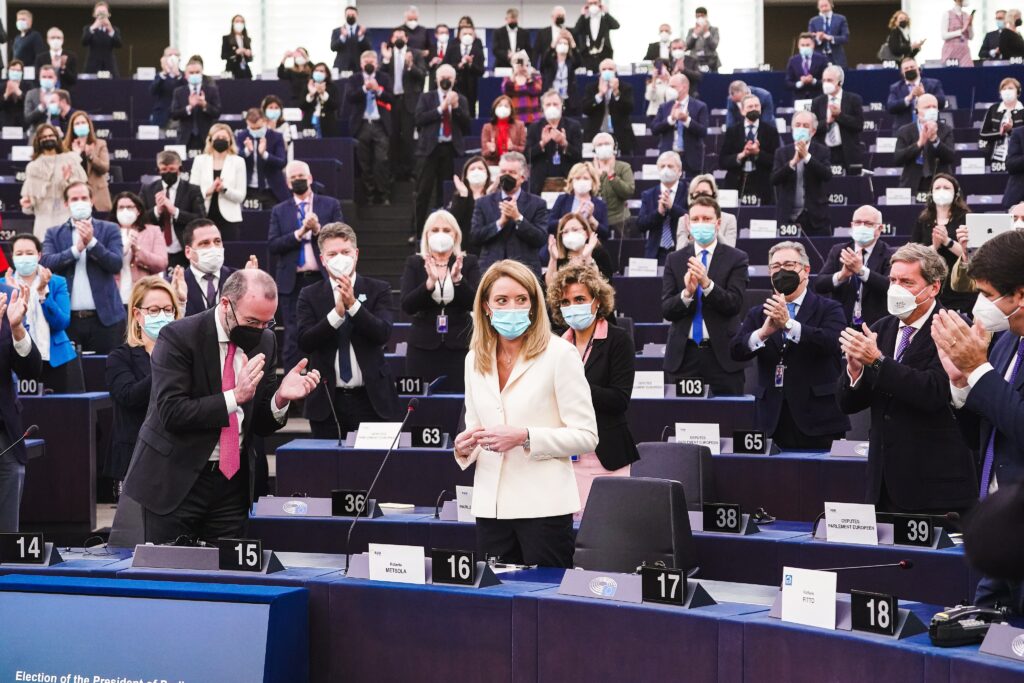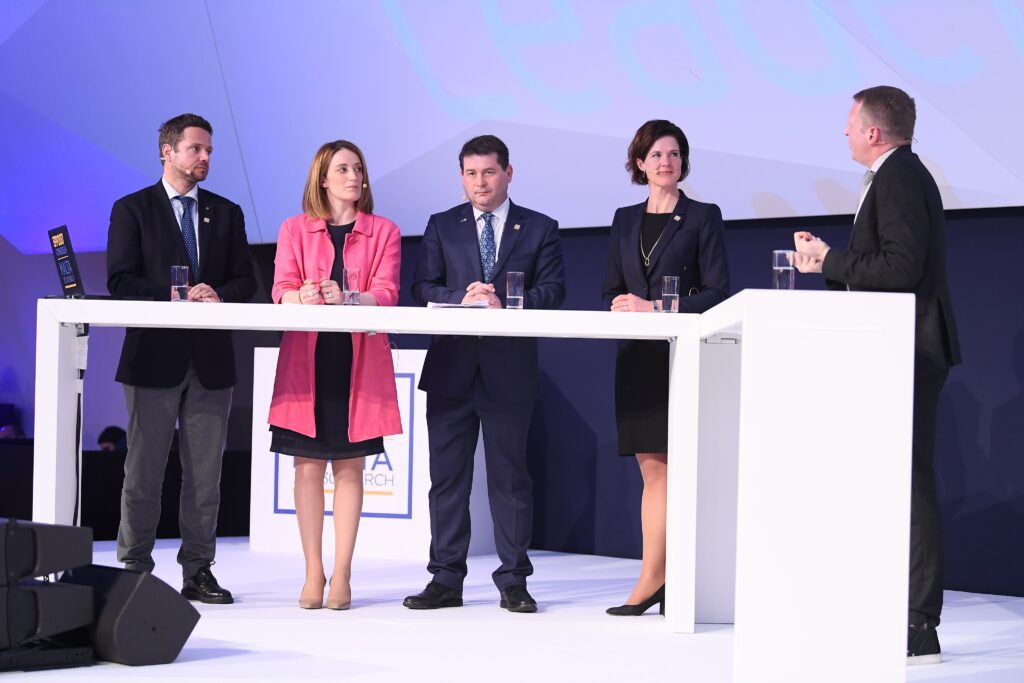The landscape of the European Parliament is transforming, ignited by the representational change that the first months of 2022 have brought about. In January, Roberta Metsola, a Maltese Member of the European Parliament (MEP), was chosen to lead the institution until 2024. This development gains even more relevance taking into consideration the delicate moment in which the European Union finds itself: Still pushing for recovery from the downturn caused by the COVID-19 pandemic, it is now being confronted with instability and conflict right at its eastern door.
On top of that, the Parliament is facing its own institutional challenges. It remains commonly perceived as subordinate to its two co-legislators, the Council and the European Commission. That is especially in the context of highly sensitive policy areas, such as social or justice and home affairs, but also when it comes to civil liberties and the rule of law. These are the uneasy waters that Metsola will have to navigate through.
Her progressive outlook on the rights of women, migrants, and the LGBTQ+ community in the EU is undoubtedly a source of both inspiration and aspiration. The way in which she constructed her own leadership persona and the largely positive record associated with her nine years in office as an MEP indicate a promising start to her mandate, but not without controversy.
Road to the presidency
Metsola joined the European Parliament in 2013 as a representative of Malta’s Nationalist Party and member of the centre-right European People’s Party (EPP) Group, otherwise known as the Christian Democrats. She subsequently acquired an instrumental role within the EPP Group by working in its preparatory Bureau. However, her influence came to be much wider, as she did not hesitate to make herself heard during plenary sessions, especially on migration and other topics of debate important to her home country.
Her first real breakthrough Metsola achieved in November 2020, when she got elected as the Parliament’s First Vice-President, becoming the first Maltese national to hold such a high-level position in an EU institution. The new role came with great institutional responsibility, both internally and externally: Metsola was first in line to support President David Sassoli, and chair plenary sessions in his absence. Further, she played a key role in the representation of the Parliament in its relations with the other EU institutions.
In 2019, when President David Sassoli was elected, the EPP and the Socialist and Democrats (S&D) Groups struck a power-sharing agreement according to which Sassoli, part of the latter parliamentary group, was to cede half of his term in office to a member of the former. Just a day before the election this January, the two largest parliamentary groups were joined by the third in rank, Renew Europe, which also agreed to back Metsola. In exchange, the S&D Group obtained reassurance that its political priorities would be taken into account and secured other important positions in Parliament. This solid backing enabled Metsola to obtain as many as 458 out of 690 votes from fellow MEPs, making her the new President of the European Parliament.


Aside from the party’s favourable dynamics, Metsola’s success is also a result of how she projected herself as a political activist and mother from the geographically and politically marginalised Republic of Malta. She gained additional credibility by advocating for the “vulnerable”, the “oppressed”, and for “every woman in our Union still fighting for her rights,” – acting as their voice in Parliament.
Metsola’s declared aim to “build bridges” is what gives hope in times of increasing social and political cleavages within the European Union. Her inauguration speech she emphasised the strong European core which is increasingly challenged by those who seek to undermine its fundamental values. In line with this perspective, Metsola aims to improve the Parliament’s standing in EU affairs as a guarantor of diversity and inclusion.
Tackling EU-wide challenges
“Our house matter” is what Metsola has repeatedly stated with reference to the European Parliament. Her strong emphasis on human rights and fundamental freedoms as part of her politically pacific approach will likely constitute the regulatory leadership that the institution needs. One should keep in mind, however, that as President, Metsola will first and foremost have to represent “the opinions of the House”. Therefore, her efforts towards some of the most significant points of contention in Parliament are in danger of being undermined by ongoing institutional tensions.
The new president’s intentions are arguably clear, especially when it comes to fighting against corruption and promoting the rule of law across the EU’s member states. Metsola’s anti-corruption efforts began at home. In Malta she was vocal in uncovering the lack of public transparency, and demanding answers in several cases involving the harming of investigative journalists, most notably the assassination of Daphne Caruana Galizia in 2017.


Metsola’s staunch support for an anti-corruption reform in Malta was matched by a similar response to developments elsewhere in the EU. Her voting record as an MEP was overwhelmingly in favour of addressing instances of corruption, most recently in Bulgaria. In addition, she openly welcomed the decision of the Court of Justice of the EU against the actions that Hungary and Poland brought forth in response to the rule-of-law conditionality of the COVID-19 recovery fund.
Furthermore, Metsola became a point of reference, both in her country of origin and in the European Parliament; also in terms of managing migratory movements in a way that does not overlook migrants’ rights. Coming from a country that lacks the capacities to deal with this form of human movement but is located along one of the most common migration routes towards the EU contributed to her activism.
Importantly, her long-time emphasis on the struggle of disadvantaged groups promises an increased representation of their interests in the legislative process. Perhaps most evident is Metsola’s prioritisation of women’s rights. She is known to have propelled progressive resolutions as an MEP, especially dealing with sexual harassment and other forms of gender-based violence. Her dedication was further emphasised during her inauguration speech where the president gave a blunt warning sign to “those who deny the rights of our LGBTIQ citizens – know that this House will never accept it”. The fact that three out of four current EU presidents are women is encouraging for a just future within Europe and possibly beyond.
Despite the breath of fresh air Metsola brings, her rather conservative position on abortion does not reflect the same level of progressiveness. The associated political dimension should not be overlooked. One of the reasons behind this apparent paradox is the loyalty to her national party. Abortion has undoubtedly been the controversial topic that Metsola tried to circumvent throughout her political career. She even voted against providing easier access to the medical procedure. Some have pointed to a discrepancy between her declared activism on issues of human rights and her opposition to what could be perceived as a form of access to health care services – which are guaranteed by the EU Charter of Fundamental Rights.
By and large, the difficult context of the European Parliament’s change in leadership will continue to be tricky grounds to operate on for newly elected Roberta Metsola. Nevertheless, her political actions in important present-day issues signal a chance for a generational shift and improved representation of minority interests across the European Union. “Europe is about all of us standing up for one another” – will Metsola’s vision come to mark a new stage in the European integration project?
Liviana Strambeanu




